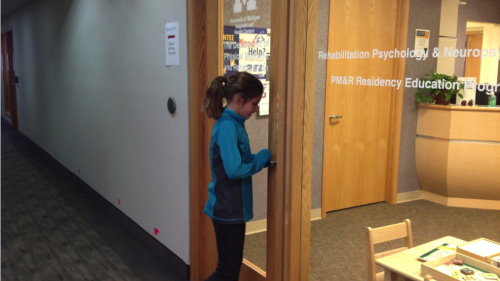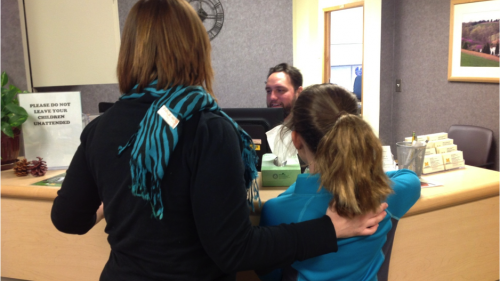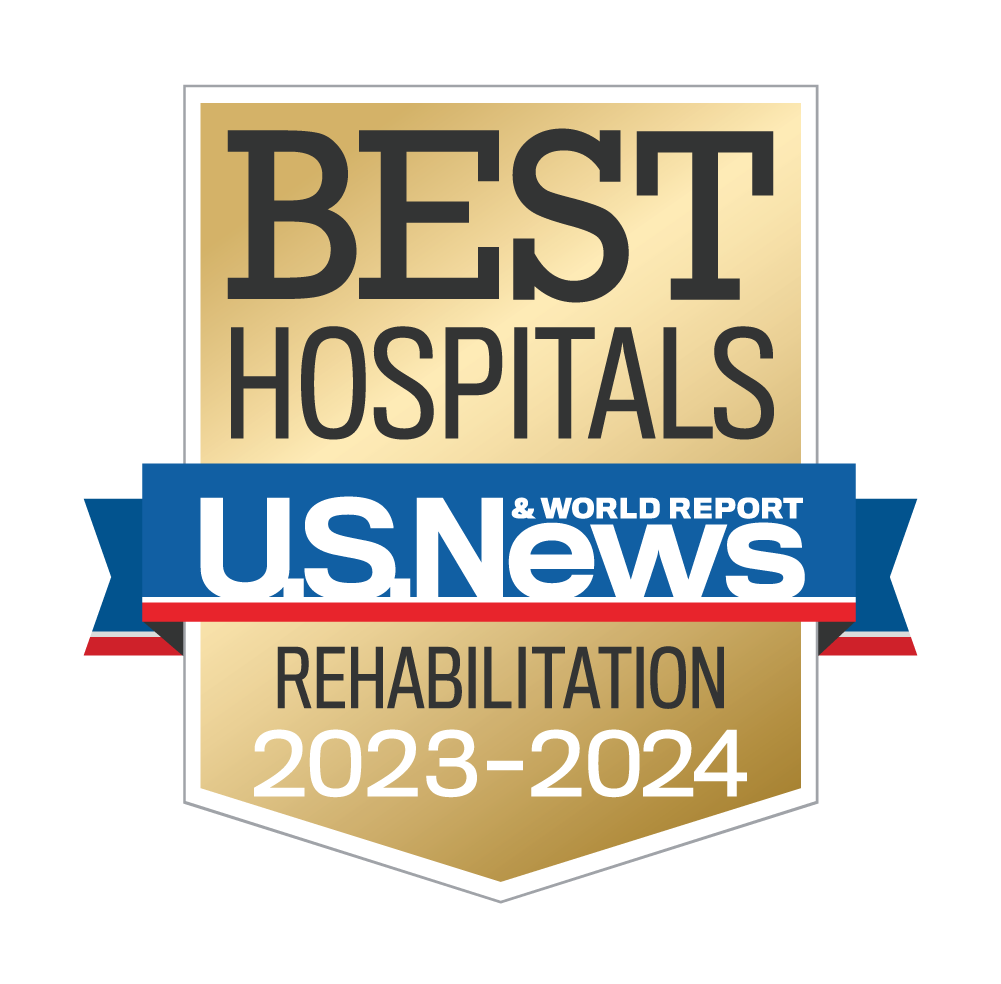Pediatric Neuropsychology Assessment Clinic
Our pediatric Rehabilitation Psychology/Neuropsychology team offers comprehensive neuropsychology assessments to patients with a wide range of clinical concerns. Our outpatient clinic serves patients from birth to young adulthood. Many of our youngest patients receive care through the Early Developmental Clinic at our Pediatric Rehabilitation Center location.
About Neuropsychological Evaluations:
When is a neuropsychological evaluation recommended?
A neuropsychological evaluation is a comprehensive evaluation may be recommended when:
- There are concerns with how a child is developing
- A child has a medical condition that can lead to challenges with learning and behavior
- There has been an illness or injury that may affect learning and behavior
- Pediatricians or pediatric medical specialists are seeking additional data to help make a diagnosis
- There are concerns with memory, learning, attention, or other aspects of problem solving
- A child has a surgical or medical treatment where monitoring of cognition is helpful
Which conditions are commonly seen in our clinic?
Although the Rehabilitation Psychology/Neuropsychology group is able to see a broad range of patients, we have a particular expertise in working with individuals who have neurodevelopmental diagnoses, complex medical profiles and acquired brain injuries. Common conditions treated in our clinic include:
- Cerebral Palsy
- Traumatic Brain Injury and Concussions
- Genetic Conditions (e.g. Fragile X, Down Syndrome, Klinefelter, NF-1)
- Seizure Disorders
- Metabolic and Endocrine Diseases
- Pediatric Cancers (e.g. leukemia, brain tumor)
- Fetal Alcohol Spectrum Disorders
- Stroke
- Muscular Dystrophies
- Craniofacial Conditions (e.g. cleft lip/palate, craniosynostosis, DiGeorge's)
- Hearing Loss and Cochlear Implant
- Infections of the Brain and Encephalitis
- Other Neurological (nervous system related) Conditions
What will happen at a neuropsychology assessment appointment?
For a tour of a typical appointment (helpful to go through with your child prior to his/her appointment) please click here!
- Before you arrive for your appointment, the neuropsychologist will read available medical records and referral notes.
- When you arrive, the neuropsychologist will bring you and your child back to the clinic room to explain the structure of the day and answer any questions you may have about testing.
- Your child will meet with the doctor briefly to discuss topics such as school work, thinking skills, friendships and coping/adjustment. Many children do very well to meet alone with the doctor though you may be asked to stay with your child during this interview period. Parents/caregivers then meet with the doctor to review a full history including early development, medical history, family history, school performance and any current concerns with thinking and behavior.
- Depending upon whether your child is having a half-day or full-day evaluation they may stay with you while you are meeting with the doctor or they may begin working immediately with the testing technician.
- Your child will work with our master level psychology testing technicians completing the neuropsychology testing. Parents/caregivers do not sit in on testing and it is our experience that children do quite well with this.
- Your child will either spend a half day with us or will take a lunch break with you (restaurants nearby) and return for more testing in the afternoon.
- You will return another day to review the results of testing with the doctor (discuss with your doctor whether your child should attend that feedback appointment).
What does testing look like? Does it hurt? Is it Scary?
- Neuropsychology testing is completed seated at a table and working with a testing technician (called a psychometrician). Our psychometricians are all master level psychology practitioners with a specific expertise in working with children in a health care setting.
- Patients complete paper-pencil activities, memory activities, tests that require paying attention, academic activities and intellectual testing. Each child's test battery is personalized depending upon the purpose of their visit.
- There are no painful/frightening procedures (no shots, x-rays, etc.) and most children tolerate testing very well. We have found that even children who are fearful can quickly settle in and have a good day with us in the clinic.
- Children will be given breaks and are permitted to bring snacks or comfort items if they are particularly nervous. We will do our best to use behavioral strategies to encourage your child to do their best, and we ask that you prepare them for doing their best while they are with us.
- Many of our patients enjoy the one-on-one attention and report having a nice visit with our clinic!
What will we get out of this appointment? Why did our doctor send us for testing?
- Neuropsychology testing can be used to help us understand your child's learning and behavior profile better.
- Testing allows us to make individualized recommendations for school and home to help your child with his/her development.
- Testing can be used to help make or confirm diagnoses when your doctor is unsure.
- Neuropsychology testing can help us monitor your child's recovery from an illness or injury and support the medical team in developing a treatment plan.
- We can help you and your child make key developmental transitions in school and into the adult world including advocacy and school communications.
- Most parents/caregivers report that testing provides a sense of relief and comfort when they can better understand their child's developmental pattern and learning/cognitive needs.
I have more questions
Please call our clinic at 734.936.7052 and we will do our best to answer all of your questions.
What will happen at a neuropsychology assessment appointment?
Before your appointment:
Before your appointment, you will speak with a scheduling representative from our clinic who will discuss logistics of your appointment as well as any insurance issues that you should be aware of. We will send you a new patient packet by postal mail or email. We make every effort to get accurate information about your personal insurance policy though we advise you to get in touch with your insurance company to verify information. We do our best to provide a reminder call to you in the days prior to your appointment. It is very important that you call us as soon as possible if you must cancel your appointment; we are typically unable to accommodate rescheduling no-shows due to our high volume of patients.
On the day of your appointment:
You will come to our clinic located at 325 E. Eisenhower Parkway in Ann Arbor (click here for directions). Remember the following things to help your child have a good appointment:
- Please tell your child about their appointment ahead of time do not spring it on them the day of as we find this leads to more, not less anxiety.
- Make sure your child is well rested the night before.
- Your child should take all of their regular medications including medications for ADHD the day of their appointment. If you have questions about medications please ask prior to the appointment.
- Your child should wear their glasses, hearing aids, and any orthotics the day of their appointment. Please be sure to know where these are the day before the appointment.
- If your child uses a communication device, please bring this with you.
- Please ensure your child has a proper breakfast the day of their appointment. They can also bring snacks with them for during the day.
- In the week prior to your appointment please ensure that you have gathered all outside medical/psychology records and academic records including the most recent IEP (Individualized Education Plan) if your child has one. Please bring the full IEP including the most recent testing.
- Please do your best to not bring young siblings to the appointment if at all possible. The day is quite long and we will require your undivided attention when we meet with you. We are unable to provide supervision to unattended children in the waiting room.
- You or a responsible adult (18 years or older) will be required to remain in the waiting room while your minor child tests with us. Thank you for your understanding of this safety based policy.
When you arrive:
Welcome: Come to the 3rd floor and come through the first glass door (Rehabilitation Psychology/Neuropsychology). You will check in at our reception area. You will likely be asked to sign documents related to insurance coverage and receiving care at the University of Michigan. Your provider will be alerted that you have arrived. If you have a brief wait, the waiting room has relaxing toys and activities for your child in a comfortable setting.

Meet with the doctor: Your doctor will come to greet you personally in the waiting room and bring your family back. You are welcome to bring additional family members or support to help provide information and support your child, though we encourage you to avoid bringing siblings to the appointment.
The doctor will meet with your child in order to observe your child's language skills, social skills and if appropriate to learn about their school day. You may remain with your child, or your child may meet privately with the doctor. Many children have an easier time talking about school and friends without a parent present, and great care is taken to ensure a comfortable environment. Younger children may play briefly to help them settle into the clinic.
Your child may complete a brief test of walking and simple hand movements when with the doctor. There are no shots or anything uncomfortable. Most children find these activities fun and engaging.

Your child will be escorted back to meet with one of our psychometricians (testing technicians) across the hall. We will make sure your child is comfortably settled in and may start with some warm-up activities before we start testing. Your child may bring comfort items with them if you feel this will help them. Your child will work privately with the psychometrician (we do not have parents/caregivers in the room) and we have considerable experience helping even the shyest children settle in to have a successful day. If your child has a half-day afternoon appointment they will remain with you while you meet with the doctor and meet with the testing technician after their lunch break.
Once your child is settled, you will meet with the doctor to provide a comprehensive history including any current or past concerns, medical history, school information and behavioral information. Please take time to write a list of your questions ahead of time and organize any documents to help make the best use of your time with the doctor. You are your child's expert and we consider the parent/caregiver interview to be one of the most important parts of the testing process.
After you meet with the doctor: You will likely be asked to complete a few paper-pencil surveys while your child is testing. Your child (particularly if younger) will likely take multiple relaxation or bathroom breaks during their testing day. You are welcome to provide snacks or comfort items while they take their break with you. As the day progresses the testing technician will be able to give you a general sense of the pace of work for your child and when they may finish up though each child is different and we encourage you to plan to stay the full length of time you were told when the appointment was made. Full day appointments and half-day afternoon appointments will include a 1-hour lunch break. You are welcome to bring a sack lunch for your child and family or visit a quick nearby restaurant; there is no cafeteria in our building.
Finished with testing: When your child is done they will be released to your care in the waiting room. Many children enjoy picking a prize from the treasure chest to celebrate their hard work. Please be aware that testing is very tiring business so be prepared that your child will likely be tired and need quiet down time after they finish their appointment.
When the test results are back:
You will make an appointment to review feedback with the doctor, typically within 1-2 weeks following your child's appointment. Your appointment may be in person or may be offered as a phone feedback depending upon the distance you travel and the complexity of your child's feedback. Younger children do not typically attend feedback appointments, though for older children we encourage you to discuss with the doctor whether your child should attend this appointment. You will meet with the doctor (in person or by phone) to review the results. At the feedback appointment you can expect to:
- Review how your child did during their testing session
- Discuss any new diagnoses the doctor feels may be relevant
- Discuss recommendations for medical follow-up, school and home supports to help your child
- You will receive a full report summarizing the testing by mail and/or email
Some parents report feeling nervous before coming to a feedback appointment though we would encourage you to view these appointments as opportunities to learn more about your child's strengths and skills. We are here to help you process any new information and guide you through the process of obtaining the resources you need for your child to succeed. Many of our parents/caregivers find feedback appointments very helpful for understanding and helping their children.



